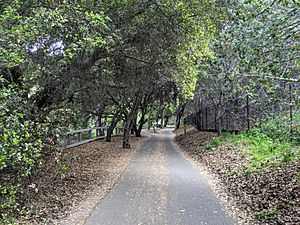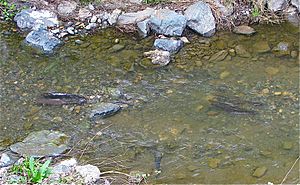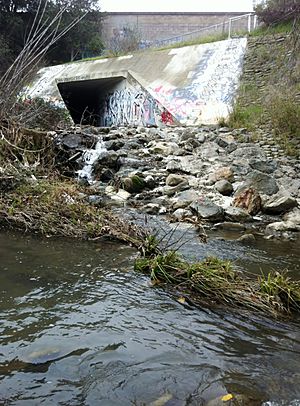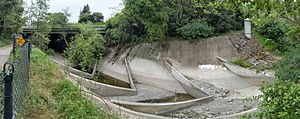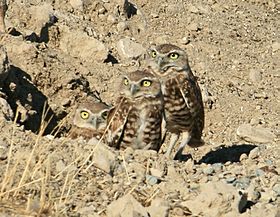Stevens Creek (California) facts for kids
Quick facts for kids Stevens Creek |
|
|---|---|
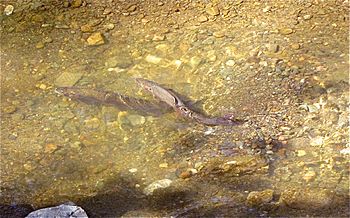
Steelhead trout and spawning redd on Stevens Creek
|
|
| Native name | Arroyo San José de Cupertino |
| Other name(s) | Cupertino Creek |
| Country | United States |
| State | California |
| Region | Santa Clara County |
| City | Mountain View, California |
| Physical characteristics | |
| Main source | Black Mountain in the Santa Cruz Mountains Monte Bello Open Space Preserve 37°18′40″N 122°11′14″W / 37.31111°N 122.18722°W |
| River mouth | Southwest San Francisco Bay Whisman Slough, Mountain View, California 3 ft (0.91 m) 37°26′45″N 122°03′49″W / 37.44583°N 122.06361°W |
| Basin features | |
| Tributaries |
|
Stevens Creek is a cool waterway in Santa Clara County, California. It starts high up in the Santa Cruz Mountains, near a place called Black Mountain. The creek flows through Stevens Creek Reservoir and then travels north for about 12.5 miles (20.1 km) through cities like Cupertino, Los Altos, Sunnyvale, and Mountain View. Finally, it empties into the San Francisco Bay at Whisman Slough. This spot is close to Google's main campus.
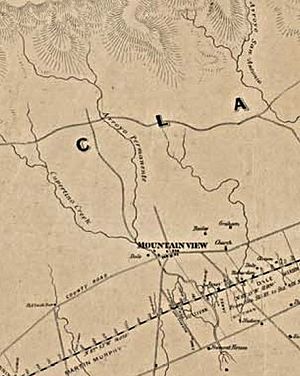
Contents
History of Stevens Creek's Name
Stevens Creek has had a few different names over time!
First Name: Arroyo San José de Cupertino
The creek was first named Arroyo San José de Cupertino by a Spanish explorer named Juan Bautista de Anza. This name means "Saint Joseph of Cupertino Creek" in Spanish. De Anza camped by the creek in 1776 during his trip from Monterey to San Francisco. He was the first person to find an overland route to San Francisco Bay.
In his diary, de Anza wrote about arriving at the "Arroyo San José de Cupertino." He said it was a good spot for travelers to stop for the night. The Diocese of San Jose has even set aside a special spot called de Anza's Knoll as a public open space.
From Cupertino Creek to Stevens Creek
The name "Saint Joseph of Cupertino" is still used today in the city of Cupertino. The creek's name changed to Cupertino Creek sometime before 1866. But later, it was renamed again for Elijah Stephens. He was a blacksmith and trapper who settled by the creek in 1848.
Elijah Stephens called his property "Blackberry Farm." He was famous for leading the Stephens-Townsend-Murphy Party. This was the first group of people to cross the Sierra Nevada mountains in wagons. This happened two years before the well-known Donner Party.
Understanding the Stevens Creek Watershed
A watershed is like a big bowl where all the rain and snow that falls drains into one main river or creek. The Stevens Creek watershed covers about 29 square miles (75 km2). The creek itself is about 20 miles (32 km) long. It flows into the San Francisco Bay near Moffett Field.
Stevens Creek Reservoir
There's a big dam on Stevens Creek that creates Stevens Creek Reservoir. This reservoir was built in 1935. Its main job is to collect winter rainwater. This water is then used to refill the underground water supply for the Santa Clara valley aquifer. The reservoir can hold a lot of water, about 3,465 acre-feet (4,274,000 m3).
The Santa Clara Valley Water District manages the reservoir. They release water during the summer. This helps keep the creek wet for about 5.7 miles (9.2 km) below the reservoir. This is important for fish like steelhead.
Creek Branches and Connections
Many smaller streams, called tributaries, flow into Stevens Creek above the reservoir. These include Indian Creek, Bay Creek, Gold Mine Creek, Swiss Creek, and Montebello Creek. Another stream, Heney Creek, joins Stevens Creek further downstream.
There's also a special channel built in 1959. It sends winter storm water from Permanente Creek into Stevens Creek.
Explore the Stevens Creek Trail
The Stevens Creek Trail is a fantastic path for biking and walking. It's about 5-mile (8 km) long. It starts at Shoreline Park and goes south into Mountain View.
Cupertino has also built about 1-mile (1.6 km) of the trail. This part runs north along the creek from McClellan Road to Stevens Creek Blvd. It passes by the 4-H farm and community gardens in McClellan Ranch Park. The trail is safe because it's completely separate from car traffic. It uses bridges and underpasses to cross roads.
The cities of Sunnyvale, Cupertino, Los Altos, and Mountain View are working together. Their goal is to connect the trail all the way from the Bay to the Santa Cruz Mountains.
Wildlife and Protecting Nature
Stevens Creek is home to some amazing animals. People are working hard to protect their homes and make sure they can thrive.
Steelhead Trout: Life Cycle and Challenges
Stevens Creek used to be one of the best places for steelhead (a type of rainbow trout) to live. People even fished for trout here in the 1800s. Scientists have studied the steelhead in Stevens Creek. They found that these fish are native to the coast and are related to steelhead in other nearby creeks.
However, steelhead face big challenges when they try to swim up Stevens Creek to lay their eggs (spawn). There are several barriers, like old fish ladders and concrete structures. These barriers can block the fish or get clogged with dirt. Also, the lower parts of the creek can get very warm or even dry in summer. This makes it hard for young trout to survive.
Groups like the Stevens & Permanente Creeks Watershed Council are working to help. The Santa Clara Valley Water District is also planning to remove some of these barriers. This will make it easier for steelhead to reach the colder, upper parts of the creek. This is super important for their survival and reproduction.
Red-bellied Newt: A Surprising Find
The red-bellied newt is a special type of salamander. For a long time, people thought these newts only lived much further north in California. But then, a group of them was found in the upper part of Stevens Creek! Scientists found that these newts are genetically the same as the ones up north. It's a mystery whether they were brought here or if they are a very old group that has lived here for a long time.
Western Burrowing Owl: Protecting Their Homes
The western burrowing owl is a small owl that lives in burrows in the ground. They nest near the mouth of Stevens Creek at Shoreline Park. These owls are special because they often reuse their burrows for many years.
Unfortunately, the number of burrowing owls in California has been going down. They are listed as a "Species of Special Concern" by the California Department of Fish and Game. This means they need protection. Their biggest problem is losing their flat, grassy homes to new buildings. While it's against the law to disturb them during nesting or to harm them, their homes aren't always permanently protected. Many groups are working to find ways to protect these unique owls and their habitats.
 | Isaac Myers |
 | D. Hamilton Jackson |
 | A. Philip Randolph |


